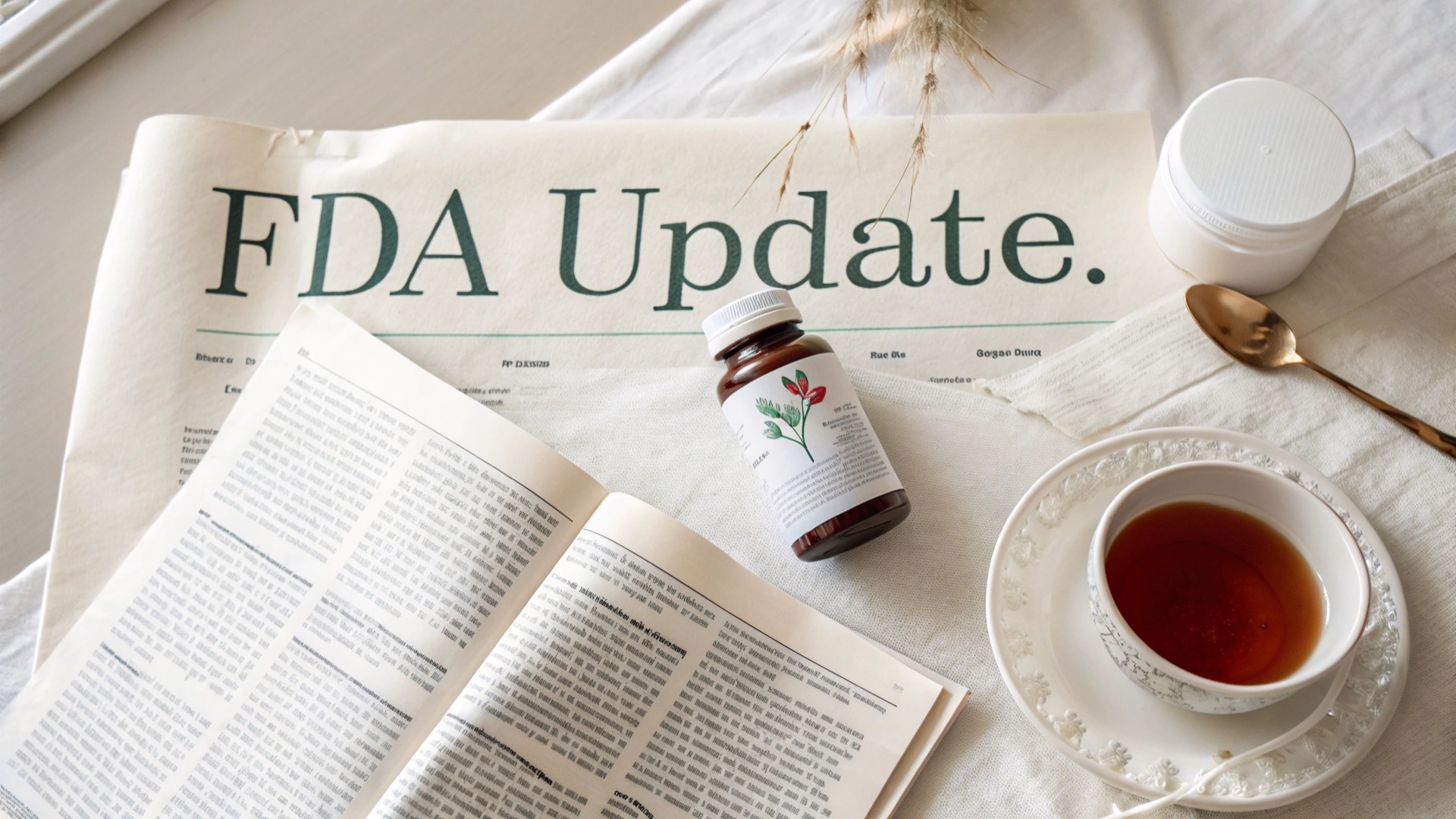Key takeaways
- NMN and NR are NAD+ precursors known for their anti-aging potential. Most reported side effects are mild and include headache, nausea, and flushing.
- NMN lacks FDA approval as a dietary supplement due to its investigation as a drug.NR is Generally Recognized as Safe (GRAS) by the FDA, offering greater regulatory stability.
- Long-term human safety data for both NMN and NR remain sparse.
Overview
Aging gracefully is a desire shared by many, and with the rise of NAD precursors like NMN (nicotinamide mononucleotide) and NR (nicotinamide riboside), the potential for anti-aging breakthroughs has never felt closer.
These compounds are widely touted for their ability to boost NAD+ levels, a coenzyme critical for cellular energy and repair processes. Yet, like any supplement, questions about safety and side effects loom large.
While the science behind these compounds is promising, concerns remain regarding their long-term safety and recent regulatory challenges.
This article provides a detailed examination of the side effects and safety profiles of NMN and NR, synthesizing insights from clinical studies and regulatory developments.
What are NMN supplements?
NMN, or nicotinamide mononucleotide, is a compound derived from vitamin B3 and serves as a precursor to NAD+ (nicotinamide adenine dinucleotide). NAD+ is essential for metabolic energy, DNA repair, and cellular health; however, NAD+ levels naturally decline with age, contributing to diminished vitality and age-related conditions.
This decline in NAD+ is associated with cognitive decline, mitochondrial dysfunction, chronic inflammation, and metabolic dysfunction, particularly in the human brain, which can accelerate neurodegeneration and compromise overall health.
How does NMN work in the body?
NMN is a vital intermediate in the NAD+ biosynthesis pathway, directly converting into NAD+ via enzymatic processes. The salvage pathway is the primary mechanism by which NAD+ levels are maintained in cells, recycling nicotinamide (NAM) back into NAD+ and playing a crucial role in cellular metabolism.
Researchers have found that supplementing with NMN can significantly increase NAD+ levels, counteracting the age-related depletion observed in tissues such as the brain, muscles, and liver. This increase in NAD+ supports essential cellular processes, including cell division and cell survival.
Regulatory landscape
Despite its natural presence in foods like broccoli and avocado, NMN’s legality as a dietary supplement has been complicated. NMN products have become widely available in the anti-aging health supplement market, attracting significant consumer interest.
The FDA declared in 2022 that NMN should be classified as a drug rather than a supplement, citing ongoing submissions for drug development. This regulatory shift has left the status of NMN uncertain, especially in the U.S. market.
It is now imperative to supply NMN from reputable manufacturers to ensure the quality and safety of health supplement products.
Benefits of NMN
NMN supplements have attracted significant attention for their wide-ranging potential benefits, particularly in the context of healthy aging and metabolic health. One of the primary advantages of NMN supplementation is its ability to enhance energy metabolism by boosting levels of nicotinamide adenine dinucleotide (NAD+), a coenzyme essential for energy production in living cells.
As NAD+ levels naturally decline with age, supplementing with NMN can help restore them, supporting mitochondrial function, which is crucial for maintaining cellular vitality and efficient energy production.
Research from human clinical trials and animal studies suggests that NMN supplementation may enhance insulin sensitivity, thereby supporting improved blood sugar regulation and metabolic health. This effect is particularly relevant for individuals at risk of insulin resistance or metabolic diseases.
Additionally, NMN has been shown to reduce DNA damage and oxidative stress, both of which are closely linked to the aging process and the development of age-related diseases.
Another promising area of NMN research is its impact on cellular senescence and DNA repair. By increasing NAD+ availability, NMN may help slow the accumulation of senescent cells and promote more effective DNA repair mechanisms, contributing to anti-aging effects at the cellular level.
Furthermore, NMN supplementation has been linked to enhanced cognitive function and decreased inflammation, providing potential benefits for brain health and overall well-being.
Overall, the potential benefits of NMN supplements are rooted in their capacity to elevate NAD+ levels, thereby supporting gene expression, mitochondrial function, and the body’s natural defenses against age-related decline.
Dosage and administration
Determining the optimal dosage and administration of NMN supplements is an area of ongoing research, as scientists continue to investigate the amount of NMN required to achieve meaningful health benefits. Current human studies have reported positive effects with daily doses as low as 250 mg.
In contrast, higher doses, up to 1,200 mg per day, have been associated with improved aerobic capacity and physical performance. These findings suggest that both lower and higher doses of NMN may offer distinct advantages; however, further research is needed to establish the most effective and safe dosage for different populations.
NMN supplements are typically taken orally, and evidence suggests that oral administration results in high bioavailability, allowing the compound to raise NAD+ levels in the body efficiently. While NMN occurs naturally in foods such as broccoli, cabbage, and cucumbers, the quantities present in a typical diet are much smaller than those provided by dietary supplements, making supplementation a more practical option for those seeking significant health benefits.
As with any dietary supplement, it is essential to consult with a healthcare professional before starting NMN supplementation, especially since individual needs and responses can vary. Ongoing and future clinical trials will help clarify the optimal dosing strategies and further define the health benefits of NMN supplementation.
Side effects of NMN
Common mild side effects
Short-term human trials have identified minimal and tolerable side effects with NMN supplementation, such as:
- Headaches
- Flushing
- Mild gastrointestinal discomfort
For example, a study involving postmenopausal women reported minimal side effects, with one subject discontinuing due to persistent headaches during a regimen of 300 mg/day over 8 weeks.
Unknown and regulatory concerns
The FDA’s reclassification of NMN as a pharmaceutical compound raises questions about its long-term use as a supplement. While studies in animal models have shown the ability of NMN infusion to mitigate aging-related dysfunctions, more data are needed to clarify its safety profile, particularly regarding liver and kidney function, as well as reproductive health.
Human trials on NMN
Emerging clinical data from NMN trials demonstrate favorable efficacy without severe adverse effects across doses ranging from 250 mg to 500 mg per day. However, human research on NMN remains limited, and further studies are necessary to establish its efficacy and safety fully.
For instance, many of these clinical trials include a placebo group to compare outcomes between those receiving NMN and those receiving a placebo.
In one study, middle-aged participants experienced a 2.5-fold increase in whole-blood NAD+ levels, accompanied by positive effects on markers such as muscle strength and metabolic health.
NMN supplementation did not significantly affect blood pressure or blood lipids in these middle-aged participants, and some studies also monitored sleep quality as an outcome.
Side effects of NR
Mild adverse effects
Like NMN, NR is generally well-tolerated, but some users experience mild side effects, especially at higher doses (>1,000 mg/day):
- Nausea
- Flushing
- Fatigue
Preclinical studies have raised concerns about potential liver and kidney toxicity when NR is administered in exceptionally high doses, though standard dosages have not indicated similar risks.
GRAS certification
Unlike NMN, NR maintains a Generally Recognized as Safe (GRAS) status in the U.S. and has achieved FDA approval as a food supplement ingredient. This regulatory stability positions NR as a more widely accepted option for consumers seeking NAD+ boosters.
Research insights on NR
NR has shown consistent efficacy in elevating NAD+ levels. Studies spanning metabolic health and neurodegenerative disorders confirm its favorable safety profile in human populations.
For example, NR has been investigated for conditions like type 2 diabetes and Parkinson’s disease with encouraging results and minimal adverse effects.
NMN vs. NR safety comparison
| Feature | NMN | NR |
| Status in the U.S. | Under FDA scrutiny as a drug | GRAS-certified supplement |
| Common Side Effects | Headache, flushing (mild) | Nausea, fatigue (mild) |
| Long-Term Data | Limited | Moderate availability |
| Regulatory Acceptance | Uncertain | Approved in multiple markets |
| NAD+ Boost Efficiency | High | High |
Bottom line
Both NMN and NR offer promising pathways to better aging and cellular health. However, their safety profiles invite critical considerations before incorporating these supplements into a daily routine.
Before taking NMN supplements or taking NMN, it is essential to consult a healthcare professional to ensure safety and determine if an NMN supplement is appropriate for your individual needs.
- Start with clinician consultation: Always consult with a healthcare professional before starting NMN or NR supplementation to ensure safety.
- Monitor dosages closely: Stick to doses supported by clinical data (e.g., 250–500 mg/day).
- Stay updated on regulations: For U.S. consumers, NMN may soon only be available as a pharmaceutical product, giving NR a comparative advantage.
Combining NMN supplementation with regular exercise training may further enhance physical performance, muscle strength, and metabolic health.
For those eager to unlock the potential of NAD+ boosters, NR presents itself as a more stable and widely accepted option in the current landscape.
Frequently asked questions (FAQs)
- What are the typical side effects of NMN?
NMN is generally well tolerated, but some users report mild side effects such as headaches, nausea, or facial flushing. These symptoms are usually temporary. Serious side effects have not been reported in current short-term human trials.
- Is it safe to take NMN every day?
Short-term studies using doses of 300–500 mg per day for up to 8 weeks have shown good safety and tolerability. However, long-term human studies are still limited, so daily use should be approached with caution and ideally under medical supervision.
- Why did the FDA remove NMN from the supplement list?
The FDA reclassified NMN as a drug under investigation, meaning it can no longer be sold as a dietary supplement in the U.S. This change is due to NMN being studied in pharmaceutical trials for age-related diseases.
- Does NR cause any adverse effects?
Nicotinamide Riboside (NR) is considered safe and holds GRAS status; however, mild side effects such as digestive discomfort, nausea, or fatigue may occur. Most users tolerate NR well, especially at moderate doses.
- Which is better: NMN or NR?
Both NMN and NR raise NAD⁺ levels and offer anti-aging benefits, but they differ in their absorption and regulation. NR has a longer track record in human research and is legally sold as a supplement, whereas NMN is currently under FDA investigation as a potential drug.
- How does NMN affect muscle insulin sensitivity and skeletal muscle health?
NMN supplementation may improve muscle insulin sensitivity and support skeletal muscle function, particularly in older adults or those engaging in physical activity. Studies suggest NMN can enhance skeletal muscle insulin signaling, oxygen utilization, and overall muscle performance, which may help counteract age-related muscle decline.
- What role does NAD+ play in redox reactions and the methylation cycle?
NAD+ is a crucial coenzyme in redox reactions, accepting and donating electrons to support cellular energy production. It also plays a role in the methylation cycle, a process that uses methyl groups to regulate DNA expression, neurotransmitter production, and detoxification. NMN supplementation can influence these processes by affecting NAD+ levels and the availability of methyl groups, which are essential for maintaining healthy methylation cycles.
- Does NMN have any relevance to Alzheimer’s disease or the senescence-associated secretory phenotype?
NAD+ decline is linked to age-related diseases such as Alzheimer’s disease. NMN supplementation may help maintain cognitive health by supporting NAD+ metabolism. Additionally, NMN may influence the senescence-associated secretory phenotype (SASP), which is involved in inflammation and tissue dysfunction during the aging process.
- What is Metro International Biotech LLC’s role in NMN research?
Metro International Biotech LLC is developing proprietary NMN formulations, such as β-NMN (MIB-626), as investigational drugs. The company is involved in clinical research and regulatory discussions regarding NMN’s therapeutic potential and its distinction from traditional dietary supplements.
References
Song, Q., Zhou, X., Xu, K., Liu, S., Zhu, X., & Yang, J. (2023).
The safety and antiaging effects of nicotinamide mononucleotide in human clinical trials: an update. Advances in Nutrition, 14(5), 1416–1435.
Nadeeshani, H., Li, J., Ying, T., Zhang, B., & Lu, J. (2022).
Nicotinamide mononucleotide (NMN) as an anti-aging health product—Promises and safety concerns. Journal of Advanced Research, 37, 267–278.
Yang, X., Lu, A., Guan, X., Ying, T., Pan, J., Tan, M., & Lu, J. (2024).
An updated review on the mechanisms, pre-clinical and clinical comparisons of nicotinamide mononucleotide (NMN) and nicotinamide riboside (NR). Food Frontiers, 6(2), 630–643.Morita, Y., Izawa, H., Hirano, A., Mayumi, E., Isozaki, S., & Yonei, Y. (2022).
Clinical evaluation of changes in biomarkers by oral intake of NMN. Glycative Stress Research, 9(2), 33–41.








